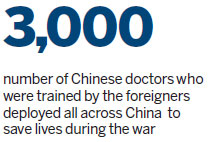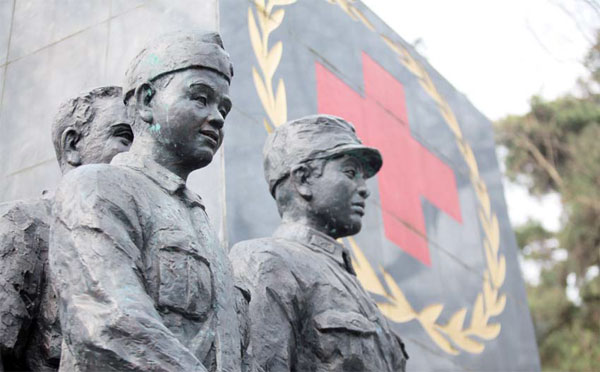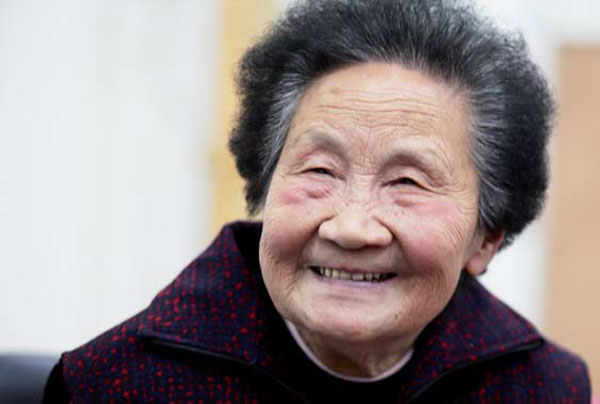City of refuge that saved thousands
Updated: 2015-05-15 08:39
By Joseph Catanzaro and Zhao Kai(China Daily Europe)
|
|||||||||||
Residents of Guiyang remember the foreign doctors who came to china in world war II
They ran into the night as the bombs continued to fall, the rattle of machine gun fire drawing closer as they ran for the last train and their last chance of escape.
The news was passed frantically down the line of fleeing men, women and children: Changsha, the capital of Hunan province, had fallen.
|
The memorial to wartime doctors, foreign and Chinese, in Guiyang, Guizhou province. Photos by Wang Yuxi / China Daily |
|
Zou Ji, 85, remembers the sick and wounded during the war and how her family fled from invading Japanese forces. |
It was 1944, and the Japanese army had arrived in central China.
Zuo Ji will never forget that night of terror. She was 13 years old when her father bundled the family out of their home and into the darkness in a desperate quest to get to the railway station and freedom.
"My father refused to surrender," she says, "so we snuck out in the night. We hid in the train. The Japanese were already in the city. I remember how scared I was that they would catch us. We were squeezed in the train. There were no seats, so I sat on a barrel. They blew up the tracks behind us when we left so the Japanese couldn't pursue us."
Zuo became one of an estimated 100 million Chinese refugees who fled the advance of Imperial Japan during World War II. Her family found refuge more than 800 kilometers away in Guiyang, the capital of Guizhou province. It would eventually become her home.
Zuo, 85, sitting at a mahjong table with friends in the city's downtown area, recalls the shock of her first days in Guiyang.
"There were so many wounded, hundreds and hundreds of them almost every day," she says.

It was not until later that she found out why so many of China's sick and battle scarred passed through the city on unsteady legs or in the back of jouncing carts.
On a jungle-clad mountainside nearby, in a hospital made of bamboo and thatch, the Red Cross had set up shop.
In this place, 20 foreigners would have a hand in saving the lives of many thousands of Chinese soldiers and civilians, service and sacrifice that local Chinese like Zuo continue to solemnly honor 70 years later.
The International Medical Team for Aid to China began to arrive in Guiyang in 1939 at the urging of Lin Kesheng, a British-educated Chinese doctor and pioneer of the Red Cross Society of China.
Arriving from all over Europe, many were from Allied countries such as Britain and Russia; some came from occupied countries like Poland; many were Germans and Austrians who had fled Nazi rule.
In China, the war is estimated to have accounted for 90 percent of all casualties in the Pacific Theater, so there was no shortage of work for the medics of Guiyang, and many sick and wounded were brought there, says Yang Yongxuan, 65.
|
From top: Sick and wounded patients in the Guiyang hospital during World War II; an operation theater in Guiyang hospital, where almost everything was made of bamboo, including the operating table; a foreign doctor operates in Guiyang during the war; British doctor Guy Courtney. Photos provided to China Daily |
Her father, Yang Xishou, was one of more than 3,000 Chinese doctors the foreigners trained who were deployed all across the country to save lives.
When she was young, Yang says, her father would tell her stories of the foreign men and women who came to help China. Mostly young and idealistic, they typically worked 10 hours a day treating patients at the hospital, or even longer on the many forays they made with Chinese medical teams to the front lines.
He told her of Lanto Kaneti, 29, a Bulgarian doctor, who fell in love with a Chinese nurse named Zhang Sunfen, how they later married and went to live in Europe after the war.
"Once they came back and visited," Yang says.
He told her of the day in 1941 when the Japanese bombed the hospital, killing five patients and a Chinese nurse.
He mentioned an Austrian doctor who died on a medical mission to Chongqing in 1945.
He talked about how, even though they were faced with the horrors of war daily, the foreigners would still throw parties and sing and dance with the locals late into the night.
But the story that stuck with Yang most was that of a young British female doctor, Guy Courtney.
The site where the hospital once stood is now a popular recreation area - Senlin Forest Park. Walking down its shaded paths, Yang passes wild monkeys cavorting in cherry blossom trees and men and women of Zuo's age doing their morning calisthenics.
At the center of the grounds she pauses before a memorial built to honor the wartime service of the doctors, Chinese and foreign, before walking to a small shrine of remembrance bearing an inscription in English.
"Dr Courtney died at her post in 1942 while working to prevent and cure the disease caused by the germ warfare waged by the Japanese," it reads.
Yang says the young doctor was the victim of a germ bomb dropped by Japanese aircraft.
"She was trying to find a cure," Yang says.
As the morning grows older, a crowd gathers before the memorial. Speeches are made; wreathes are laid; old patriotic songs ring out; Red Cross uniforms abound.
The locals have come, as they frequently do, to honor the memory of the doctors.
Yao Renli, 89, is one of them.
"I didn't know the doctors," he says. "I just come here to pay my respects."
Du Yang, the deputy park director, says many thousands of patients were admitted to the hospital every year between 1939 and 1945.
He gestures down the mountainside toward the modern city silhouetted against the sky.
"The wounded were brought up here on stretchers or by horse," he says.
Du says the local government is now trying to raise 15 million yuan ($2.4 million; 2.2 million euros) to build a replica of the original hospital.
"We must not let this story be forgotten. It's our duty to pass it down to the next generation," Du says.
The crowd begins to disperse. As they have done for decades, many will come again on Tomb Sweeping Day, the traditional Chinese festival to honor the dead. They will lay offerings of food and drink before the memorial, a practice usually reserved for ancestors.
As the last of the visitors drift away, Meng Guangquan, 46, one of the park caretakers, moves in. She takes special care to make sure Dr Courtney's memorial is cleared of leaves and litter. It is something she tries to do every day.
"These doctors came to China to help us," she says. "We should take care of their memory, too."
Contact the writers through josephcatanzaro@chinadaily.com.cn
(China Daily European Weekly 05/15/2015 page8)
Today's Top News
Xi to give Modi a hometown welcome
Li invites Cameron to visit China
Putin, Kerry pledge to get ties back on track
China set to delay maiden flight of C919 commercial jet
Ten panda poachers caught in Southwest China
Beijing concerned by Pentagon plan
Xi's trip highlights China's resolve to safeguard peace
China, Russia start search for remains of Soviet Union soldiers
Hot Topics
Lunar probe , China growth forecasts, Emission rules get tougher, China seen through 'colored lens', International board,
Editor's Picks

|

|

|

|

|

|









